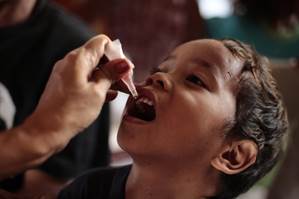
In September a case of circulating vaccine-derived polio was detected in Mindanao province in the south of the Philippines. Through ongoing disease surveillance, the presence of circulating vaccine-derived poliovirus has now been confirmed as far away as Manila. However, no cases of wild polio have been discovered.
How can polio derive from a vaccine?
Oral polio vaccine (OPV) contains an attenuated (weakened) vaccine-virus, activating an immune response in the body. When a child is immunized with OPV, the weakened vaccine-virus replicates in the intestine for a limited period, thereby developing immunity by building up antibodies. During this time, the vaccine-virus is also excreted. In areas of inadequate sanitation, this excreted vaccine-virus can spread in the immediate community (and this can offer protection to other children through ‘passive’ immunization) before eventually dying out.
On rare occasions, if a population is seriously under-immunized, an excreted vaccine-virus can continue to circulate for an extended period of time. The longer it is allowed to survive, the more genetic changes it undergoes. In very rare instances, the vaccine-virus can genetically change into a form that can paralyze – this is what is known as a circulating vaccine-derived poliovirus (cVDPV). Vaccination coverage in the Philippines has been steadily declining over the past few years, underscoring the importance of increasing coverage to at least 95 per cent of children to stop future spread of polio.
Action in the Philippines
The polio program is working with regional and country counterparts to support local Philippine public health authorities. Together they are strengthening surveillance and conducting a thorough field investigation and risk assessment around planning and implementation of immunization and outbreak response. Under the leadership of Director Raffy Garcia and with the assistance of End Polio Now Coordinator Me’Anne Solomon and others, the ten districts in the Philippines have signed a Memorandum of Understanding with the Department of Health in the Philippines to collaborate on the outbreak response.
Also, the need to establish a Rotary National PolioPlus committee in the Philippines to support the response is currently being examined.
A new vaccine on the horizon
The GPEI partners are working to develop a new vaccine to respond to such outbreaks that is more stable and does not have the ability to revert to the strength of the wild poliovirus. We are hopeful this new vaccine will be available by June 2020 and be available for outbreaks of circulating vaccine-derived polio.